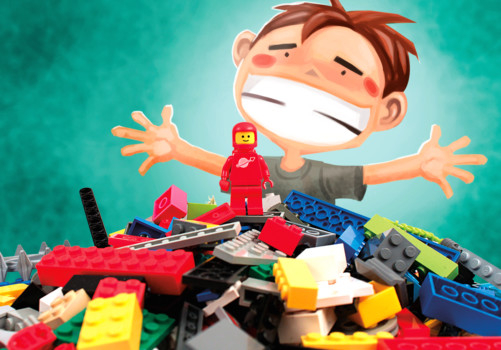
Entitled
Children today never have enough
No, I don’t think parents care about the environmental impact of the toys they buy. I would look at it from the perspective of emotions and the excitement children get out of the purchase, more than the environmental impact. Sometimes, you cannot say no to your children when they ask you for a toy. Having said that, I am also not too bothered about whether it is a branded toy or a cheap one. At the end of the day, children are going to get bored anyway and will break the toys.
So, purchasing toys has become a frequent habit for us, because you keep buying the toys that children request for. After our children have used the toys, the only way they can be reused is by donating them. There are several charities in the UAE and we take our children with us when we go to donate these toys. I would say we donate almost half of the toys, because many of them are not in a condition to be donated.
There has definitely been an overconsumption of toys in the past few years but you cannot blame this on parents or children. The media has a lot to do in this scenario, as all the cartoon shows and films that expose children to characters and their adventures, makes them get excited about buying toys. So, as long as this industry is encouraging children, the behaviour is not going to change. If something has to be done for the environment, then it has to start from films and the manufacturers of these toys.
When you compare the amount of toys children have today, to the amount we had in our chilhood, there is an obvious difference, simply because it was really tough to spend as much, back then. Today, the value of such items has diminished, so even when a person does not earn as much, he wants to avail of all the luxuries, and is sometimes willing to go into debt to satisfy his family. Of course, this has an impact on children, because they are not as grateful when they receive all these luxuries. They do not really evaluate whether something is worth buying and even when we do buy something for them, they are excited for a minute or two and then they want something else.
As a father, I try to show videos to my children of others who are not as privileged as they are and are living very different lives. I hope they pay attention to these lessons, so that it helps them become good people.
From Mr Shahran Bin Ahmad
Entrepreneur and father of two living in Dubai
Education
Make them earn what they get
I do not think parents care about the enviromental side of this issue. Usually, parents would give the toys away to other parents, or they may donate it to a nursery, which is great. At our nursery, we accept donated toys because we have many play dates where parents come in with their children, and we try to have toys for them. However, what is really important is to sanitise these toys before you give it to other children, whether it is by washing them down with soap and water or using rubbing alcohol. You do not want to pass the germs on to other people and many parents do not think of these things.
There is definitely an overconsumption of toys, simply because some parents might buy something for their child when they are visiting a store and their child would start crying because he or she wants something. I am also not a fan of the free toys you get with meals at fast food restaurants because they might not be age-appropriate. You need to be careful with those because if they are too small, a child could choke on them. Just because they are toys does not make them any safer. I am also not a proponent of cheap plastic toys. I prefer something that has substance and is educational, for example something that can help a child learn about colours, sizes and shapes. You can also buy wood blocks instead of plastic blocks, because there are concerns about certain plastics and chemicals causing cancer.
Go to an learning centre and they will show you the educational toys that you can buy for your child. Pay attention to how it is built, seriously do your research, because it is about your child.
With the over-supply of toys, something that I do worry about is the effect it has on a child’s mindset. Back in the day, you did not get a toy unless you did something positive, like completing your chores or behaving well. You have to expect something from children so that they learn that for everything you do in life, there is a reward, but you have to earn it. You don’t just get it.
From Ms Diane Nobles-Eldakak
Operations manager of a nursery based in Abu Dhabi
Practicality
What makes more sense - recycling or incineration?
Parents do care about purchasing toys and they do tend to give it away for charity as well, so that other people can use them. In my household, we collect the toys that are no longer being used and even my neighbours collect them and give them away. I never see them being discarded in the garbage bin, unless they are damaged.
But more than what parents think, from the perspective of recycling companies, the question is - is it economically viable to recycle these toys?
In many cases, it is not, so it goes into the landfill. A toy has multiple components that it needs to be stripped of. In a toy car, for example, everything can be taken out and recycled but a battery-operated teddy bear, on the other hand, is harder. The electrical components can be salvaged but the fur goes into the landfills. It also depends on the labour cost in the country because this is manual work and if the labour costs are high, it makes more sense to dispose the item into the landfill. Having said that, many countries have incineration plants that are converting waste to energy. Singapore, Sweden and the UK use incineration plants quite successfully, which is a form of recycling.
One sensitive area is free gifts that come from companies. Sometimes, you get a free toy when you buy something and if a company wants to be responsible, they could have a collection service where they can accept returned toys after they have been used.
Whether a toy is cheap or expensive, as long as parents take some measure to try to recycle it, it is good. Plastic will always be the major component in waste production and it takes years to change behaviours. There is plastic in everything — from packaging to the item itself. How do you manage it? If you send it for recycling, you reduce the impact on the environment. But most people just throw it in the garbage.
From Mr Harbinder Singh
Project director at a recycling company based in Dubai
Values
Don’t let their happiness depend on something materialistic
This deluge of toys does not just have an environmental impact. When I look at the issue, what I see is that everybody wants to be a manager and have designer hand bags. If you look at the impact of globalisation, everyone thinks that you need certain materialistic things to prove that you are someone with status. But at the end of the day, when you rest your head on the pillow, you don’t remember all that. You remember how people treated you, who was good to you and who wasn’t. Similarly, I always preach to my children that they need to create their own happiness. You need to teach children that happiness is a journey. Even when they do not have anything around them, they should be able to go outdoors and play with the trees or with the cat on the street. It is not just about the coins for games on the internet. If they keep connecting their happiness with something that is materialistic, like the toys they have, what will they do when they grow up? My daughter told me that she wanted a lady bug flashlight because it gets really dark in her room at night. I told her that this is how the world works, you have the sun during the day and the moon during the night. Why do you think pirates wear eye patches? It is because when they have to go down the hatch, their eye can dilate immediately, and they are able to see in the dark quicker than an average person. So, stay in the dark for some time and your eyes will get accustomed to the darkness, and then you will be able to see.
But there was a time when I bought them a lot of toys. Then, one day, when my older daughter was nine years old, her friend came over and she had a phone with Whatsapp and Instagram and my daughter said she wanted one, too. That is when I realised I needed to set more boundaries.
Now, my daughter does things outside the box, volunteers with a charity and wants to be part of one when she grows up. This is what will happen when you force your children to deal with their emotions. They will be sad for a day or two ... on the third day, you will see them playing on trees and being happy. When you let them deal with the feelings of sadness, anger and denial, they develop emotional intelligence. If they don’t develop that, they might get degrees in the future but they won’t have the social intelligenece to deal with the situations life throws at them. That is why the Ministry of Education in the UAE is called the Ministry of ‘tarbiya and taleem’ which is ‘morals or values and education’. Without the morals and values in place, what is the point of education?
Of course, I am not a mean mother and I do buy my children toys and do take them out every now and again. But I am not buying them a toy because they cried or threw a tantrum. When that happens, I am very clear that they will not get what they want. But when they behave well and earn it, they do get what they have asked for.
From Ms Nora Jamal Al Suwaidi
Board member of a cancer care society and mother of three living in Abu Dhabi
— Compiled by Huda Tabrez/Community Web Editor












